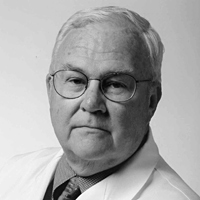| |
 |
| |
Robert Anderson '94 (EMP-28) |
| |
|
Alumni
Profile: Robert Anderson '94 (EMP-28)
At
the heart of the business
Bob
Anderson '94 has spent his long medical career trying to cure
the ailing U.S. healthcare system — and save lives
by Deborah Leigh Wood
There's
a reason more physicians are earning their MBAs, says Bob
Anderson, a retired cardiac surgeon who has worked in the
clinical and administrative sectors of healthcare for 35 years.
"The
American healthcare system is a mess, a disaster," says
the Kellogg School Executive
MBA graduate. "And if those in the medical field
don't learn how to adapt to the changes, they won't know how
to deliver cost-efficient quality care."
While
working as a heart surgeon at Evanston and Northwestern Memorial
Hospitals, Anderson enrolled at the Kellogg School, hoping
to learn how to adjust to healthcare's rapidly evolving world.
"I thought if I could see how professionals in other
industries were adapting to increasing economic constraints,
I could learn how to do so in medicine," he says. "I
was also seeking the skills to make those adaptations."
Anderson,
who grew up in Chicago and north suburban Kenilworth, and
earned his medical degree at Northwestern University, says
he got what he came for and more.
"Kellogg
gave me a whole different way of analyzing problems. I had
a terrific experience that exposed me to another part of the
world I hadn't thought about," he says. "I had always
believed in teamwork and shared responsibility, but the school
steered me away from feeling that, as a surgeon, everything
revolved around me. When I gave a speech as designated student
speaker at our Kellogg graduation, it was all about what we
all learned."
Upon
receiving his MBA as part of EMP-28, Anderson accepted an
appointment as chair of the department of surgery at Duke
University. There, he quickly put his new skills into practice,
establishing policy measures to ensure patient care and safety
while developing a "transparent reimbursement plan"
for Duke doctors who had expressed concern over vague policies
preventing them from understanding how they were being paid
for all their services.
"Because
of what I learned at Kellogg, I was able to strategize and
make change," recalls Anderson. "I was able to sound
the alarm and say, 'Get ready. It's going to be a different
world in healthcare.' It got people's attention."
Anderson,
who is a member of the Kellogg Alumni Advisory Board, says
being "straightforward to a fault" has worked in
his favor. "It's so much better than being formal because
you cut out a lot of the baloney and get to the heart of the
matter. It's important to think before you talk, but also
to say what you think."
What
he thinks about healthcare — and has thought all along
— is that "what this country needs is a single-payer
system. The government needs to be a force that cares about
people. You can't continue to exclude 47 million people. We're
getting to be like a Third World country."
Anderson
credits his success as chairman at Duke, a position he held
until 2003, to "being kinder and gentler than most heart
surgeons because I spent my entire career in an academic atmosphere,
where I constantly was confronted with smart young people."
He
says he also learned "to respond well to change"
from his father, who was a commercial developer and architect
in the Chicago area. "I observed and learned," he
says.
Now
semiretired, Anderson teaches and performs surgery at Duke
Medical Center during the winter and spring. He spends much
of the summer at his second home in the mountains of North
Carolina where he and his wife, Taimi, golf, fish, play with
their dogs and visit with their three sons, one of whom is
in healthcare administration.
Anderson
spends the fall quarter teaching a course titled "Leading
Medical Device Innovation to Market" at the Health Sector
Management Program at Duke University's Fuqua School of Business.
He also conducts research that involves working with engineering
students at Duke's Pratt Engineering School, where he received
his undergraduate degree.
Working
with others is something Anderson says he truly enjoys. "Being
in study groups at Kellogg showed me how synergy works,"
he says, "and the good things that come out of it."
|





